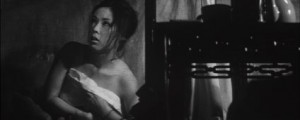From the Chicago Reader (September 3, 1999). — J.R.

A shocking and controversial masterpiece, Yasuzo Masumura’s no-bullshit antiwar film tells of an army nurse (Mizoguchi discovery and Masumura regular Ayako Wakao) in the Sino-Japanese war who sexually services an amputee and falls in love with a drug-addicted surgeon. Shot in black-and-white ‘Scope, this 1966 feature can’t be recommended to the squeamish or to viewers bound to the politically correct, but neither its nuanced eroticism nor its passionate, unpredictable moral focus can be easily shaken off. Roughly contemporary with M*A*S*H (as in Altman’s film, scenes of war-front surgery provide a corollary to Vietnam), it sometimes suggests a less comic treatment of the same theme — how to preserve one’s humanity amid impossible circumstances — but its ethics are considerably more developed. This single screening of a 35-millimeter print is an encore to Facets Multimedia Center’s revelatory Masumura retrospective last year, an opportunity equal to discovering Samuel Fuller, Nicholas Ray, or Douglas Sirk. In some respects Red Angel is the strongest Masumura film I’ve seen, and on September 25 Facets will screen his Hoodlum Soldier (1965), which I haven’t [yet] seen; both screenings are part of an ongoing series, “The Return of the Japanese Outlaw Masters.” Read more
I’m mainly reprinting this early review for the Chicago Reader, run in their July 22, 1988 issue, for theoretical reasons rather than because of any intrinsic or enduring interest in the movie involved —- which may well limit or even eliminate the piece’s interest for some readers. When I started reviewing for the Reader and discovered that I had to assign a rating, from one to four stars, to all the films I reviewed at any length, a longstanding Chicago custom, my impatience with this requirement, which struck me as both arbitrary and absurd, is part of what yielded the following. Another part is the sometimes necessary pretense of knowledge by reviewers about matters they know little about. –- J.R.
MIDNIGHT RUN
** (Worth seeing)
Directed by Martin Brest
Written by George Gallo
With Robert De Niro, Charles Grodin, Yaphet Kotto, John Ashton, and Dennis Farina.
by Jonathan Rossenbaum
Review #1


There’s a certain unavoidable imposture in the way critics (and the Academy Awards) generally break commercial movies into constituent parts and distinct contributions. To do this is to assume, first of all, that a movie’s official credits are an accurate indication of who did what offscreen, which is often not the case. Read more
From Film Comment (May-June 1975). -– J.R.
 February 28: Heathrow Airport, London. As soon as I step on the plane, TWA’s Muzak system has seen to it that I’m already back in America. Listening on the plastic earphones to blatant hypes for GOLD on two separate channels, the soundtrack of THUNDERBOLT AND LIGHTFOOT on another (where “fuck” is consistently bleeped out, but “fucker” and the sound of Jeff Bridges getting kicked in the face are dutifully preserved), it becomes evident once more that America starts and stops where its money reaches, and that “going there” means following the money trail. It’s over two years since my last visit – my longest sojourn abroad, during which I’ve had to miss the splendors of Watergate and depend on such things as Michael Arlen’s excellent TV column in The New Yorker for accounts of shifts in the national psyche — but TWA tells me in its own quiet way that nothing essential has changed.
February 28: Heathrow Airport, London. As soon as I step on the plane, TWA’s Muzak system has seen to it that I’m already back in America. Listening on the plastic earphones to blatant hypes for GOLD on two separate channels, the soundtrack of THUNDERBOLT AND LIGHTFOOT on another (where “fuck” is consistently bleeped out, but “fucker” and the sound of Jeff Bridges getting kicked in the face are dutifully preserved), it becomes evident once more that America starts and stops where its money reaches, and that “going there” means following the money trail. It’s over two years since my last visit – my longest sojourn abroad, during which I’ve had to miss the splendors of Watergate and depend on such things as Michael Arlen’s excellent TV column in The New Yorker for accounts of shifts in the national psyche — but TWA tells me in its own quiet way that nothing essential has changed. 
On the plane I read Pauline Kael’s pre-release rave about Altman’s NASHVILLE, and and it certainly does its job: I can’t wait to see the movie. But why does she have to embarrass everyone by comparing Altman to Joyce? It’s just about as unhelpful (and unsubstantiated) as her earlier comparisons of, say, LES ENFANTS DU PARADIS with Ulysees and THIEVES LIKE US with Faulkner, which confuse more than they clarify. Read more





